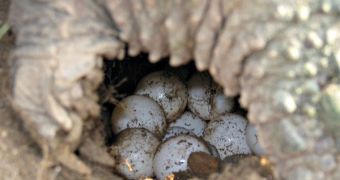Authorities in the Malaysian city of Sabah made an impressive capture on Sunday, of about 10,000 turtle eggs, packed in about 20 bags. Buying or selling turtle eggs is strictly prohibited in the country, because trade severely affects populations throughout the region. Though the culprits escaped in their boat, a police official said that the eggs may still have a chance of hatching, in specially-designed incubators.
[ADMARk=1]According to the report, four persons were identified unloading the eggs in a marina, on Sunday night. They refused to submit to the arrest and fled the scene, leaving behind their precious merchandise. Turtle eggs are fairly valuable in local markets throughout Malaysia, with a single one priced at approximately 80 cents. People eat them raw, as they are said to be very beneficial, for men more than women.
Abdul Karim Dakog, one of the policemen involved in the capture, said that the runners spoke Tagalog, a dialect that can be mainly heard in the Philippines. He also argued that the capture was the largest ever made in the area. It must have taken poachers quite some time to gather that many eggs, seeing as they are usually buried in the sand.
After a turtle lays its eggs, it covers them and leaves them to incubate. The hatchlings then dig their way out of the sand and head for the ocean. Only a small percentage of them reach the water, while the rest die along the way. The mother does not care for its young ones and leaves them to fend for themselves, thus making them very vulnerable to specialized, digging predators and humans.
Fortunately for the 10,000 eggs recovered last week, Malaysian authorities have protected areas at their disposal, which could permit for at least some of the eggs to hatch into new turtles. Prognostics are still reserved, but biologists are hopeful that a large part of the eggs will hatch.

 14 DAY TRIAL //
14 DAY TRIAL //